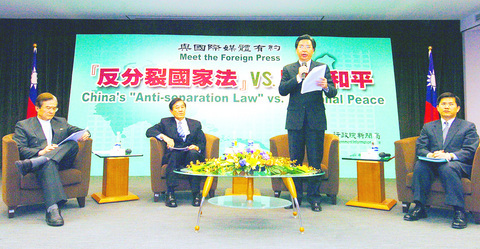China's proposed anti-secession law will establish a special court for handling cases of "separatist activity," while officials on both sides of the Taiwan Strait would be held to account if they do not act appropriately in opposing Taiwanese independence, Mainland Affairs Council Chairman Joseph Wu (吳釗燮) said yesterday.
Wu said he had not seen a draft of the law, but sources which he refused to name had passed on to him the "fundamental principles that [China] have to follow in enacting the law."

PHOTO: SEAN CHAO, TAIPEI TIMES
Wu said the bill would prohibit "secessionist activity" and stipulate punishment for offenders.
"[It will] define the status of Taiwan as ... a holy and inseparable part of the People's Republic of China," he said.
Wu said that offenders would be tried in a special court, and that Chinese government officials whose performance in curbing Taiwanese independence was found to be unsatisfactory, either by commission or omission, would also be legally responsible.
"[If] Taiwan's administration or military sectors do something that leads to war between the two sides, they will be charged with this kind of crime as well," he said.
Wu said the proposed law would give China license to define what constituted separatist activity and whether it was a crime.
"This will have serious implications and it's going to rock ... cross-strait relations," Wu said.
"I think in order to make sure what this crime is about they have to define what Taiwan independence is and ... the current definition of Taiwanese independence is quite broad," he said.
"Anything other than unification is going to be defined as independence and therefore anybody who speaks out in support of the Taiwan government might be charged with this kind of crime," he said.
"[Taipei] Mayor Ma Ying-jeou (
Ma, who was born in Hong Kong, was recently refused a visa there, apparently in retaliation for recent criticism of the proposed law.
Wu, who was joined by Minister of Foreign Affairs Mark Chen (陳唐山) and Vice Minister of National Defense Tsai Ming-hsien (蔡明憲), again called for international intervention.
They said that the international response to the bill so far had been inadequate.
Chen pointed to the words of concentration-camp survivor and Nobel Peace Prize winner Elie Wiesel, telling the foreign press yesterday that the Holocaust had occurred because "people chose neutrality."
"Ignorance and choosing to be neutral -- these are the two biggest problems," Chen said.
He said that the bill was clearly not a domestic matter because China had already discussed the matter with the US face-to-face.
When asked what the government hoped to see the international community do in response to China's actions, Wu said that, aside from popular censure, he hoped that governments would use whatever connections they had to get the message through to China.
Tsai's approach was more direct.
"I humbly ask the news media to reflect on what our people are thinking here," he told reporters.
"This is an urgent call to the international community to stop China before it is too late," Wu said.

AGING: As of last month, people aged 65 or older accounted for 20.06 percent of the total population and the number of couples who got married fell by 18,685 from 2024 Taiwan has surpassed South Korea as the country least willing to have children, with an annual crude birthrate of 4.62 per 1,000 people, Ministry of the Interior data showed yesterday. The nation was previously ranked the second-lowest country in terms of total fertility rate, or the average number of children a woman has in her lifetime. However, South Korea’s fertility rate began to recover from 2023, with total fertility rate rising from 0.72 and estimated to reach 0.82 to 0.85 by last year, and the crude birthrate projected at 6.7 per 1,000 people. Japan’s crude birthrate was projected to fall below six,

US President Donald Trump in an interview with the New York Times published on Thursday said that “it’s up to” Chinese President Xi Jinping (習近平) what China does on Taiwan, but that he would be “very unhappy” with a change in the “status quo.” “He [Xi] considers it to be a part of China, and that’s up to him what he’s going to be doing, but I’ve expressed to him that I would be very unhappy if he did that, and I don’t think he’ll do that. I hope he doesn’t do that,” Trump said. Trump made the comments in the context

SELF-DEFENSE: Tokyo has accelerated its spending goal and its defense minister said the nation needs to discuss whether it should develop nuclear-powered submarines China is ramping up objections to what it sees as Japan’s desire to acquire nuclear weapons, despite Tokyo’s longstanding renunciation of such arms, deepening another fissure in the two neighbors’ increasingly tense ties. In what appears to be a concerted effort, China’s foreign and defense ministries issued statements on Thursday condemning alleged remilitarism efforts by Tokyo. The remarks came as two of the country’s top think tanks jointly issued a 29-page report framing actions by “right-wing forces” in Japan as posing a “serious threat” to world peace. While that report did not define “right-wing forces,” the Chinese Ministry of Foreign Affairs was

PREPAREDNESS: Given the difficulty of importing ammunition during wartime, the Ministry of National Defense said it would prioritize ‘coproduction’ partnerships A newly formed unit of the Marine Corps tasked with land-based security operations has recently replaced its aging, domestically produced rifles with more advanced, US-made M4A1 rifles, a source said yesterday. The unnamed source familiar with the matter said the First Security Battalion of the Marine Corps’ Air Defense and Base Guard Group has replaced its older T65K2 rifles, which have been in service since the late 1980s, with the newly received M4A1s. The source did not say exactly when the upgrade took place or how many M4A1s were issued to the battalion. The confirmation came after Chinese-language media reported